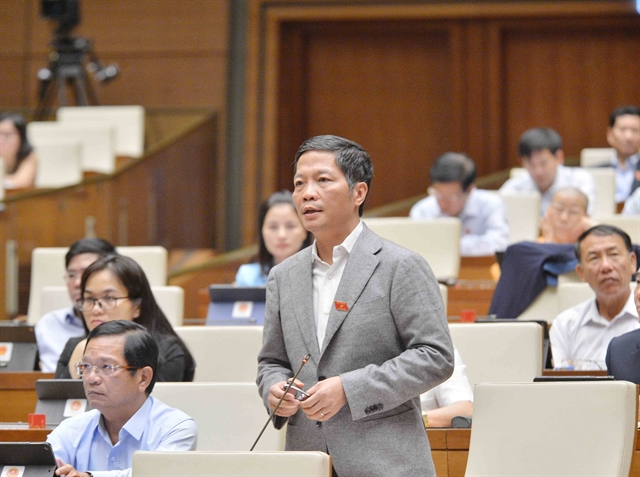 Society
Society


|
| Minister of Industry and Trade Trần Tuấn Anh speaks at the NA plenary session in Hà Nội on Thursday. — VNA/VNS Photo |
HÀ NỘI — Many National Assembly (NA) deputies pointed to the need to invest more in human resources for the country’s sustainable development in the plenary session on socio-economic issues on Thursday in Hà Nội.
Deputy Hoàng Văn Cường from Hà Nội said it was necessary to prioritise the development of high-quality human resources to boost innovation and start-ups as only innovation could enter high-value stages of the value chain to increase labour productivity and create breakthrough growth.
He added that universities were considered the cradle of high-quality human resources. However, he said, investment in tertiary education in Việt Nam was low, accounting for 0.33 per cent of GDP. Meanwhile, in some other countries, the investment rate is 1.1 per cent although the number of students is less and the GDP scale is larger.
He suggested investing in domestic universities to develop them into schools of international standards.
Deputy Bùi Thị Quỳnh Thơ from central Hà Tĩnh Province said localities often focused on economic targets while paying less attention to matching human resources planning with social demand, considered a foundation and motivation for economic development.
She said the education sector, for example, lacked more than 45,000 teachers for kindergartens, some 18,000 teachers for primary schools and 11,000 teachers for secondary schools as of last year. However, the authorities failed to prepare human resources plans to tackle that shortage.
In other sectors, Government reports proposed developing an innovation ecosystem in line with international standards and implementing digital economy, which means that the economy will need a huge number of workers well trained in information technology and electronics, according to Thơ.
She suggested paying more attention to human resources planning as the foundation for the country’s development. Localities needed to have measures to develop human resources as well as policies and roadmaps to train and attract human resources.
Deputy Phạm Tất Thắng from Mekong Delta province of Vĩnh Long said it was essential to complete the legal framework about education and training and improve teachers’ quality.
At the session, deputies also discussed other socio-economic issues, including the State budget, public investment, restructuring the economy and national target programmes.
They proposed measures to implement the five-year economic development strategies for 2021-25 and 2021-2030 with the target of developing the country into a modern industrial nation by 2030 and a developed and high-income country by 2045.
Deputy Hoàng Văn Cường from Hà Nội said in the development plan for 2021-25, investment in strong economic corporations was needed.
He also suggested mobilising different sources for development investment.
Deputies also discussed hydropower projects.
Regarding some deputies’ concerns about hydropower projects’ efficiency and environmental impacts, Minister of Industry and Trade Trần Tuấn Anh said at present, there is an important legal process to manage and ensure investment efficiency of hydropower projects.
“This is a basic factor to help authorised agencies to decide investment and assess hydropower project efficiency as well as the projects’ negative impacts,” he said.
Hydropower projects were required to have measures to limit shortcomings and negative impacts, he said.
He added that reports on the environmental assessments of hydropower projects were a decisive factor to help agencies approve investment plans and these reports must be publicised.
At the session, Minister of Natural Resources and Environment Trần Hồng Hà discussed a number of issues of deputies’ concern about natural disasters and climate change. — VNS




